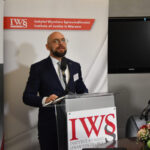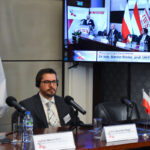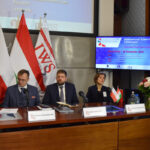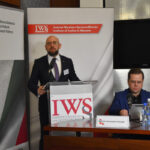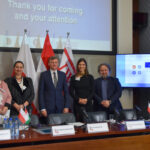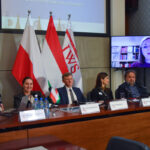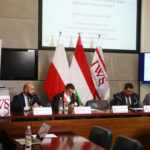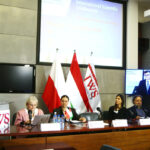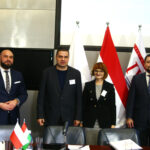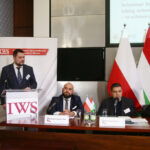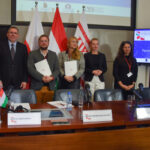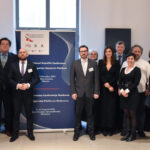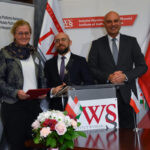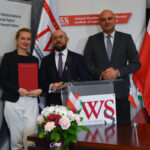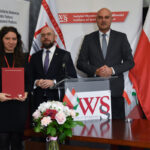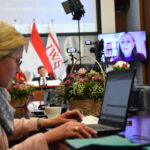Artificial intelligence and protection of older people
2022-11-23
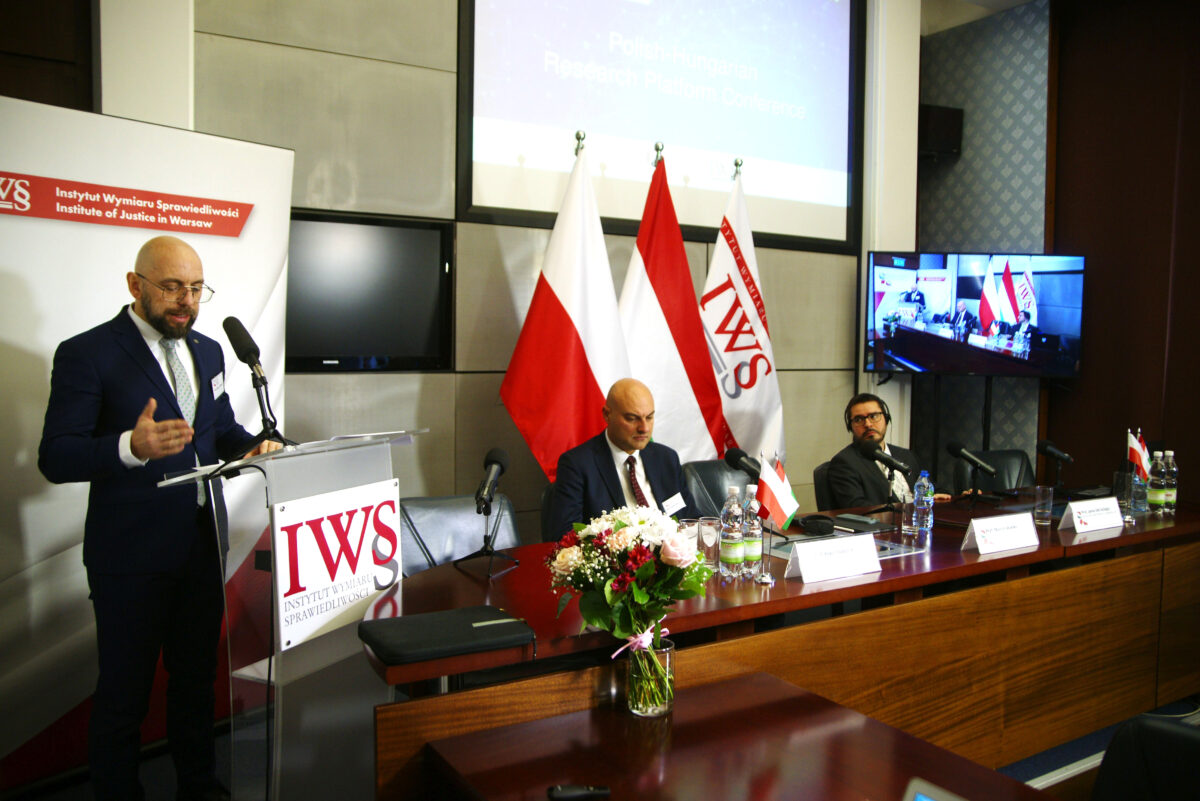
Several dozen eminent scholars from Poland and Hungary summarised the research they conducted in 2022. An academic conference organised by the Justice Institute demonstrated among others the need for accelerating regulatory work on artificial intelligence and improving the legal protection of older people.
During the Polish-Hungarian Research Platform that took place on 21-22 November in Warsaw, results of research undertaken as part of international cooperation between the Justice Institute and the Ferenc Mádl Institute of Comparative Law in Budapest were presented. “Following many months of exciting, interesting but also intense work, we summarise the results achieved by four Polish-Hungarian research teams. The scholars dealt with artificial intelligence, reform of the administrative judiciary, protection of older people and mediation,” Dr hab. Marcin Wielec, professor of the Stefan Wyszyński University of Warsaw and director of the Justice Institute, said.
Institutes from Warsaw and Budapest
The “Polish-Hungarian Research Platform” project of the Justice Institute is the result of close cooperation with the Ferenc Mádl Institute of Comparative Law in Budapest. “We brought together 24 eminent scholars from Poland and Hungary. They include representatives of the most important research institutions from both countries who staged several dozen open events, so-called academic workshops. The teams worked in groups to provide chapters for academic monographs, resulting in more than 1000 pages of published international analysis so far,” Prof. Wielec noted.
The purpose of the “Polish-Hungarian Research Platform” project is to invigorate the international cooperation between lawyers and work out new methods of drafting legislative bills that could be used in domestic and European law. “Cooperation with the Justice Institute is an incredible opportunity for Hungarian scholars to participate in a research programme on so high a level. As a third-party observer, I cannot but admire how the Justice Institute is ambitiously extending its research to one Central European country after another,” Prof. dr János Ede Szilágyi, director of the Ferenc Mádl Institute of Comparative Law in Budapest, said.
The Hungarian institute is also cooperating with the Central European Academy that coordinates a network of Central European professors, whose members include also numerous Polish professors connected to the Justice Institute. “We engage with certain topics to translate the features of legislation in our region into legal science, to avoid being subject to various legal whims, but also to cast a glance from the viewpoint of our national experience and legal traditions,” Prof. Szilágyi stressed.
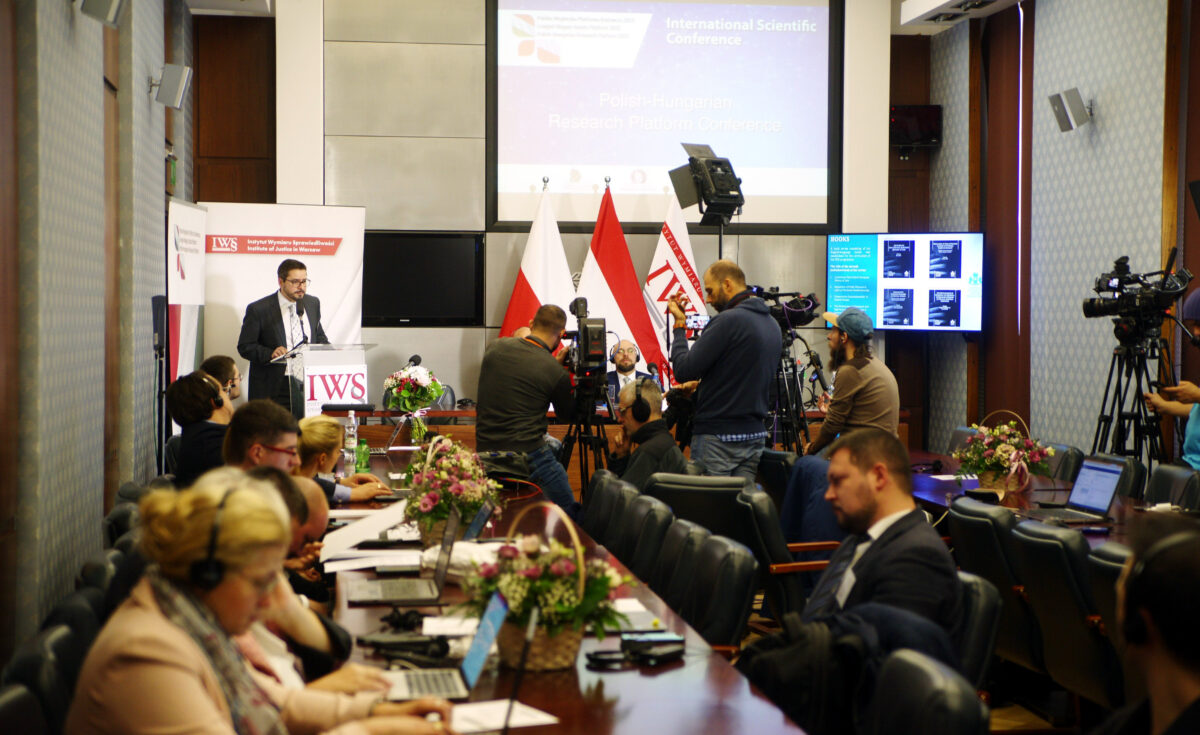
Four research platforms
The Polish-Hungarian Platform managed by the Justice Institute, combined with its Polish-Slovak, Polish-Croatian, and Polish-Ukrainian counterparts, is supposed to serve as a source of knowledge, exchange of experience and environment used to forge sound ideas originating in Central Europe and taking into account the peculiar nature of the region. “We want projects managed by the Justice Institute to become one of the leading scientific and research programmes in Central Europe,” Prof. Wielec stressed.
In the “Polish-Hungarian Research Platform” project, four Polish-Hungarian research teams were established. Each team consists of six eminent representatives of legal science with expertise in either theory or practice. “This year, our research was conducted in four crucial areas that are important for economic, social and legal reasons – indeed areas that are very important for the functioning of our state communities,” Prof. Wielec added.
The Justice Institute director said that research on legal aspects of artificial intelligence (AI) is particularly important, especially as regards finding several answers to new and not yet analysed occurrences in the area of law. The second area is the reform of the administrative judiciary, tackling the issue of modernising and increasing court effectiveness.
In response to demographic changes and social expectations, international research on legal protection of older people has also been undertaken. “The results of research will allow us to verify whether currently applicable legal regulations are adequate to satisfy current and future needs and expectations of older people, contributing to adjustments in law or adopting regulations improving the quality of life and personal satisfaction,” the Institute’s director said.
Another important area of research is mediations as an alternative method of out-of-court dispute resolution. “Mediation is undoubtedly the method to eliminate court backlogs and, thanks to the Ministry of Justice and especially the involvement of minister Marcin Romanowski, is now experiencing a veritable revival in Poland,” Prof. Wielec stressed.
Law and artificial intelligence
In researching artificial intelligence (AI), the most important aspect is to find answers to questions such as the role to be played by current international AI-related legal regulations and their future impact on the legal framework of AI functioning in Poland.
The Polish-Hungarian research platform dealing with artificial intelligence was managed by professor of the Stefan Wyszyński University of Warsaw, dr hab. Agnieszka Gryszczyńska, who holds an engineer’s degree in information technology and PhD in legal science. She notes that research on AI clearly demonstrates regulatory and legislative shortcomings in the age of modern technology; the lack of regulations on EU and domestic level becomes an ever-increasing obstacle to developing the application of state-of-the-art technological solutions. “Europe must strive towards legal regulations of and programmes to support artificial intelligence, or else fall behind in the global race to apply modern technologies. It is a race in which the United States and Asian countries, especially China, are now leading the pack,” Prof. Gryszczyńska said.
The Polish-Hungarian conference discussed numerous problems related to applying artificial intelligence and presented drafts for legal solutions which are already at an advanced stage. “Currently, we are waiting for further developments of the Artificial Intelligence Act, an EU-level regulation, so that we can have a clear view of how AI issues are going to be regulated in Europe. Our Polish-Hungarian research will be very helpful in implementing EU regulations in member states because some of these EU solutions will operate directly, but others require the domestic legislator to intervene,” Prof. Gryszczyńska noted.
Research of the Polish-Hungarian platform has also shown that there are areas, in both private sector and public administration, in which artificial intelligence can be applied even now. However, this is only possible when there is no high risk of breaching the protection of sensitive data. “I can imagine AI being used in the preliminary stage of penal proceedings. My dream is to have artificial intelligence submit, for instance, a draft indictment for my approval. AI would be very helpful in, for example, alerting the authorities to repeated proceedings concerning the same cybercriminal act, which would enormously simplify the work of prosecutor’s offices,” Prof. Gryszczyńska explained.
Protection of older people
Another team in the Polish-Hungarian platform conducted research on the very socially important issue of legal protection of older people. The purpose of the project is, among others, to come up with a legal definition of an older person, design legal and social safeguards and establish uniform access to health care benefits.
The team works on drafts of international scope legal guarantees that are meant to improve the social status of older people. “After a few months of work it turned out that we have only begun to explore an area that needs to be thoroughly researched. Our discussions showed that issues of legal protection of older people quickly snowballed. With each subsequent research meeting we had more and more problems and issues to resolve. Multiple instances of excluding and limiting the rights of older people are often mentioned, but so far almost never researched,” said Dr hab. Wojciech Lis, professor of the Catholic University of Lublin from the Family Law and Family Rights Department.
Article 68 of the Constitution of the Republic of Poland says that: “Public authorities shall ensure special health care to children, pregnant women, handicapped people and persons of advanced age.” “As regards older people, these words need to be fleshed out and translated into normative law, because older people are not treated with priority in any respect. If an older person needs to wait for a doctor visit or hospital treatment as long as a 30-year-old does, they may not live to see it,” Prof. Lis stressed.
Similar problems were also pointed out by Prof. Erika Csemáné Váradi from the Ferenc Mádl Institute of Comparative Law in Budapest. In her view, older people do not have access to the same medical therapies that young people do, which may be an important issue from a penal law viewpoint. “Nursing homes are slow to summon a doctor, which means that chances of recovery following hospitalisation are also much lower,” Prof. Váradi said.
The Hungarian professor also drew attention to the fact that discussion on human rights often deals with sex, sexual orientation or race, but people’s age is not a major factor in it. “If we have the Gender Equality Plan, or various initiatives guaranteeing equal rights for women, enshrined in international documents, a document granting equal rights to older people should likewise exist, because it is age that is the most frequent cause of discrimination on EU level,” Prof. Váradi stressed.
Opening of the “Polish-Hungarian Research Platform”
Presentation of research results by the Artificial Intelligence Research Team
Presentation of research results by the Legal Protection of Older People Research Team
Presentation of research results by the Administrative Justice Research Team
Presentation of research results by the Mediation Research Team
Conference of the Polish-Croatian, Polish-Slovak and Polish-Ukrainian Research Platform






